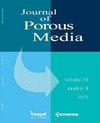Application of Artificial Neural Network for Modeling of Motile Microorganism-Enhanced MHD Tangent Hyperbolic Nanofluid across a vertical Slender Stretching Surface
IF 2.3
4区 工程技术
Q2 ENGINEERING, MECHANICAL
引用次数: 0
Abstract
The Levenberg-Marquardt back propagation artificial neural networks (LM-BP-ANNs) procedure is used in this analysis to show the computational strategy of neural networks for the simulation of MHD Tangent hyperbolic nanofluid (THNF). The THNF flow comprised of motile microorganism has been considered across a vertical slender stretching surface. The fluid flow has been examined under the significance of chemical reaction, magnetic field, activation energy, and heat source. The modeled equations are simplified to the ordinary system of differential equations using similarity variables substitution. The Lobatto IIIA formula based on the finite difference method (FDM) is employed for the nano liquid flow problem with an accuracy up to 5 decimal points. The robustness of Lobatto IIIA is its straightforward executing of very nonlinear coupled differential equations. The outcomes of FDM are manipulated to set up the reference datasets for LM-BP-ANNs technique. Several operations involves testing, authentication, and training are carried out by developing a scheme for different fluid problem elements using reference datasets. The accurateness of LM-BP-ANNs is tested through mean square error, error histogram, curve fitting figures and regression plot. Moreover, the examination of flow model factors for concentration, mass and momentum outlines are expressed through graphs.应用人工神经网络建立动感微生物增强型 MHD 切向双曲纳米流体穿越垂直细长拉伸表面的模型
本分析采用 Levenberg-Marquardt 反向传播人工神经网络(LM-BP-ANNs)程序,展示了神经网络模拟 MHD 切向双曲纳米流体(THNF)的计算策略。由运动微生物组成的 THNF 流被考虑穿过垂直细长拉伸表面。在化学反应、磁场、活化能和热源的作用下对流体流动进行了研究。利用相似变量替代法将模型方程简化为常微分方程组。基于有限差分法(FDM)的 Lobatto IIIA 公式被用于纳米液体流动问题,精度可达小数点后 5 位。Lobatto IIIA 的稳健性在于它可以直接执行非常非线性的耦合微分方程。FDM 的结果可用于为 LM-BP-ANNs 技术建立参考数据集。通过使用参考数据集为不同的流体问题元素制定方案,涉及测试、认证和训练等多项操作。通过均方误差、误差直方图、曲线拟合图和回归图测试 LM-BP-ANNs 的准确性。此外,还通过图表对浓度、质量和动量轮廓的流动模型因素进行了检验。
本文章由计算机程序翻译,如有差异,请以英文原文为准。
求助全文
约1分钟内获得全文
求助全文
来源期刊

Journal of Porous Media
工程技术-工程:机械
CiteScore
3.50
自引率
8.70%
发文量
89
审稿时长
12.5 months
期刊介绍:
The Journal of Porous Media publishes original full-length research articles (and technical notes) in a wide variety of areas related to porous media studies, such as mathematical modeling, numerical and experimental techniques, industrial and environmental heat and mass transfer, conduction, convection, radiation, particle transport and capillary effects, reactive flows, deformable porous media, biomedical applications, and mechanics of the porous substrate. Emphasis will be given to manuscripts that present novel findings pertinent to these areas. The journal will also consider publication of state-of-the-art reviews. Manuscripts applying known methods to previously solved problems or providing results in the absence of scientific motivation or application will not be accepted. Submitted articles should contribute to the understanding of specific scientific problems or to solution techniques that are useful in applications. Papers that link theory with computational practice to provide insight into the processes are welcome.
 求助内容:
求助内容: 应助结果提醒方式:
应助结果提醒方式:


